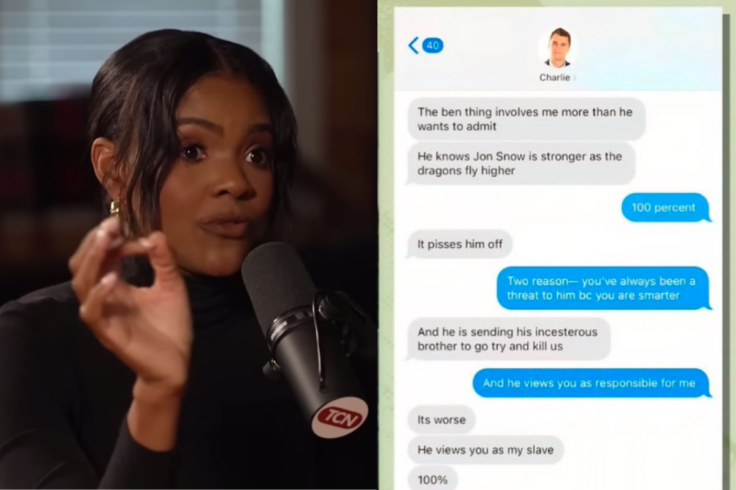'Laughably Fake': Candace Owens' Charlie Kirk 'Slave' Texts Debunked by Analyst
Digital sleuths challenge authenticity of alleged messages amid conservative media infighting

Candace Owens is facing backlash after posting screenshots of alleged messages from the late conservative activist Charlie Kirk, which included inflammatory references to 'slavery' and accusations against commentator Ben Shapiro. Digital analysts and online sleuths now claim the images are doctored, fueling tensions within the conservative media sphere.
The Alleged Messages and Their Claims
Owens shared the screenshots on X (formerly Twitter), claiming they were sent by Kirk in 2018. The texts appeared to show Kirk accusing Shapiro of trying to sabotage both his and Owens' careers, with one message referencing Owens as 'his slave' in a metaphorical context. The posts quickly went viral, sparking outrage and confusion across political and media circles.
However, the authenticity of the screenshots was immediately questioned. Critics pointed to formatting inconsistencies, timestamp anomalies, and font mismatches that suggested the images may have been altered.
Analysts Call the Screenshots 'Laughably Fake'
One of the most widely circulated rebuttals came from user @CBHeresy (Frank McCormick), who posted a detailed forensic breakdown of the alleged screenshots. After running the images through ChatGPT for analysis, McCormick concluded they were fabricated. He cited multiple design inconsistencies based on Apple's San Francisco typeface metrics, message bubble geometry, and colour-rendering standards.
According to McCormick, the evidence includes:
- Bubble design: Real iPhone message bubbles have smoother edges, tighter padding, and different curvature. These appeared to be mockups or generator templates.
- Profile placement: iMessage does not show the sender's face above each message; it only appears at the top of a thread or in group chats.
- Header layout: The contact bar ('Charlie' with a circular photo) doesn't match any known iOS version.
- Font and spacing: The text lacks Apple's San Francisco typeface and proper line spacing.
- Colour balance: The grey bubbles are too dark and lack iMessage's subtle gradient and depth.
McCormick added that even older iOS versions followed consistent design rules for spacing, header layout, and typography — none of which matched the image Owens posted. 'Together, these details show it isn't a real iPhone screenshot but a digitally fabricated mockup made to look authentic,' he wrote.
Further criticism came from user @Awesome_Jew_, who amplified McCormick's findings and summarised the fallout as 'laughably fake, riddled with misaligned bubbles and wrong fonts, making Owens look delusional, dishonest, and desperate for attention.'
Candace Owens recently posted what she claims are more text messages from Charlie Kirk.
— Frank McCormick (@CBHeresy) November 8, 2025
After having ChatGPT analyze the images, I believe Candace fabricated them.
The model compared the screenshot to real iMessage UI design patterns, typography, and layout structure. Its… pic.twitter.com/jar2ZcErpn
Conservative Media Rift Deepens
The controversy comes amid escalating tensions between Owens and other figures in the conservative media ecosystem. Kirk, who passed away earlier this year, had been a close collaborator of Owens during their time at Turning Point USA. The alleged texts also implicated Ben Shapiro, suggesting he had attempted to undermine both Owens and Kirk professionally.
While Shapiro has not publicly responded to the screenshots, sources close to his media outlet have dismissed the claims as baseless. The incident has reignited debates about loyalty, credibility, and internal rivalries within right-wing commentary circles.
Owens' History With Controversial Claims
Candace Owens has previously faced criticism for sharing unverified or misleading content. Her supporters argue that she is being unfairly targeted, while detractors point to a pattern of inflammatory rhetoric and questionable sourcing.
As of now, Owens has not provided metadata or device-level verification to support the authenticity of the Kirk messages. No independent outlet has confirmed the texts as genuine, and no forensic expert has publicly validated the images.
🚨BREAKING: Candace Owens is getting ripped apart after posting supposed 2018 iMessages from the late Charlie Kirk, accusing Ben Shapiro of scheming to “kill” their conservative rise and calling her Kirk’s “slave.”
— Awesome Jew (@Awesome_Jew_) November 9, 2025
The stunt exploded in her face as analyst @CBHeresy exposed the… pic.twitter.com/5KCejtAZyI
What Comes Next?
The fallout from the alleged texts continues to ripple through social media, with calls for Owens to clarify or retract the posts. Analysts warn that the spread of unverified claims, especially involving deceased individuals, poses ethical and reputational risks.
Until verifiable evidence emerges, the messages remain in dispute. For now, the consensus among digital analysts is clear: the screenshots are 'laughably fake.'
© Copyright IBTimes 2025. All rights reserved.



















